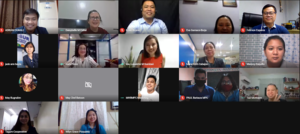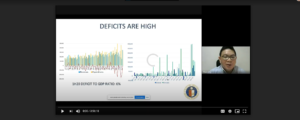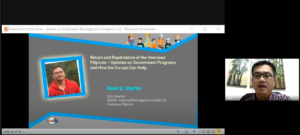Building the Resilience of Reintegrated Overseas Filipinos in Times of Crisis
Title:
Building the Resilience of Reintegrated Overseas Filipinos in Times of Crisis
Date Published:
09/10/2020
NATCCO’s Diaspora Program, along with its Co-op and development partners organized the Online Reintegration Forum on Sustainable Reintegration of Overseas Filipinos through Cooperatives on August 20, 2020. The forum gathered more than fifty cooperative leaders, resource persons, and government officials involved in the reintegration program, and NGO partners that work tirelessly to support the reintegrated Overseas Filipinos in this time of crisis.
The economic crisis induced by COVID-19 could be long, deep, and pervasive when viewed through a migration lens, especially for a country like the Philippines. Overseas Filipinos face the risk of contagion and also the possible loss of employment, wages, and health insurance coverage. In fact, thousands have already been repatriated and estimated that the number will increase in the coming months. Overseas Filipinos and remittance families are typically both resourceful and resilient in the face of difficult circumstances and changing conditions. But COVID-19 is disrupting an entire system that directly involves our Overseas Filipinos around the world and their family members back home.
The forum presented the following salient points:
- Co-op support and intervention can be done in every point of the migration journey: Pre-OF, as a current OF, and Reintegration. In each phase, co-ops can develop products and services that are responsive to their needs.
- Preparation for Reintegration is not only limited to financial preparedness but Reintegration can be seen through a holistic, inclusive view that looks at 1) Health of the OF, 2) Families of the OF, 3) Friends and Community upon reintegration that needs to be created, 4) Financial preparedness, 5) Lifestyle change and adaption, 6) How to sustain Personal Growth as you reintegrate, and 7) How to sustain Professional Growth as you reintegrate. From these 7 considerations, we can develop social, financial, and psychosocial solutions for the reintegrated and soon-to-reintegrate OFs.
- Co-ops are well-positioned to facilitate recovery and investments because they are connected and integrated with the agricultural value chains and markets with relatively manageable risks.
- 5 Trillion Pesos are saved in the bank. This is an opportunity for co-ops to promote its savings and time deposits to members and potential members and encourage a Co-op Transfer Day Campaign.
- Remittances can be maximized through 1) Strengthening an inclusive rural remittance market, 2) Link adapted financial options and services to remittances, 3) Provide savings investment options to OFs abroad and returning OFs, 4) Promote entrepreneurship by linking financial services and non-financial services to remittances.
- If we maximize remittances for development, we can leverage it to break the intergenerational cycle of migration. This can be done through Savings Mobilization, Asset Building, Income Opportunities, and Job Creation.
- The government, through its reintegration arm, the National Reintegration of Center for OFWs (NRCO), can be tapped for our co-op programs locally. We can coordinate with our Provincial and Regional DOLE and NRCO offices.
- Volunteerism through Cooperatives can be one of the ways that we can help the government in the reintegration program. NATCCO will coordinate with you for these opportunities in the coming weeks; this includes the BalikaBayanihan Program, which NATCCO is one of the partners.
NATCCO extends its gratefulness to all the resource persons for their generous sharing of expertise.
- Alvin P. Ang, PhD - Director, Ateneo Center for Economic Research and Development (ACERD), Ateneo de Manila University.
- Pedro De Vanconselo, Senior Technical Specialist – Coordinator, Financing Facility for Remittances, International Fund for Agricultural Development (IFAD)
- Roel Martin , OIC, Director, National Reintegration Center for Overseas Filipinos
- Donald James D. Gawe Don J Gawe, Executive Director Philippine National Volunteer Service Coordinating Agency - NEDA
- Erwin Brunio, PhD Erwin Brunio, Entrepreneur/LSE Secretariat Head – Tokyo, Japan
- Mai Dizon-Anonuevo Mai Dizon-Anonuevo, Executive Director, ATIKHA
- Cristina Liamzon and Edgardo T. Valenzuela, ALSE OF LIFE Program, Ateneo School of Government
- Juris Perez, CEO, Tagum Coop, Eva B. Garnace-Borja, CEO, SACDECO, Emon Espares, CEO, Barbaza MPC
Through its inclusive programs and services, cooperatives facilitate a sustainable alternative that balances financial gains with strong social objectives for the members, especially the Overseas Filipinos and their families.



